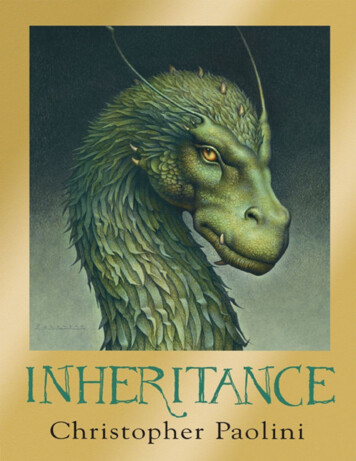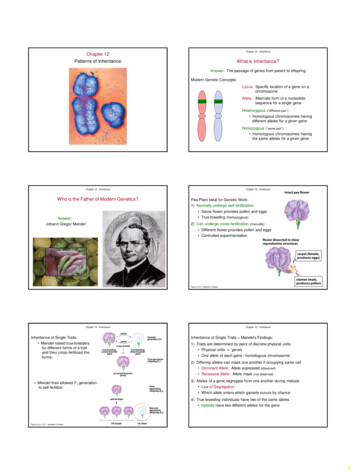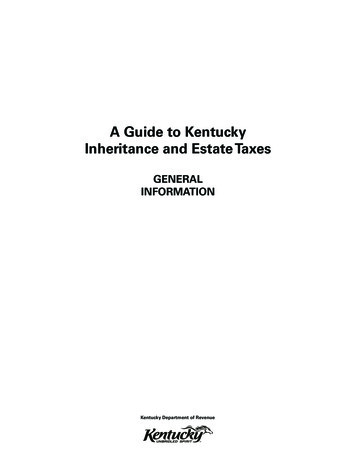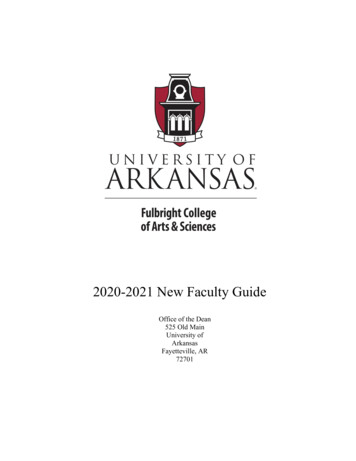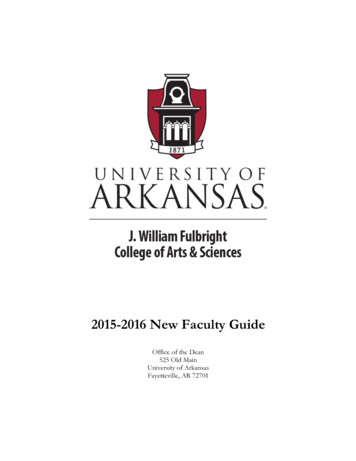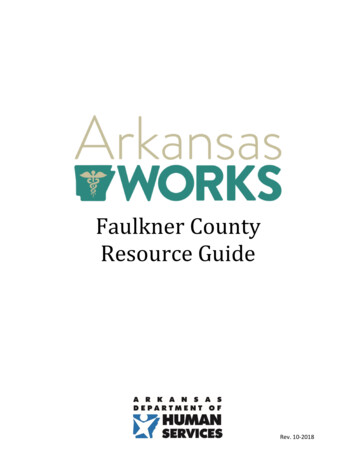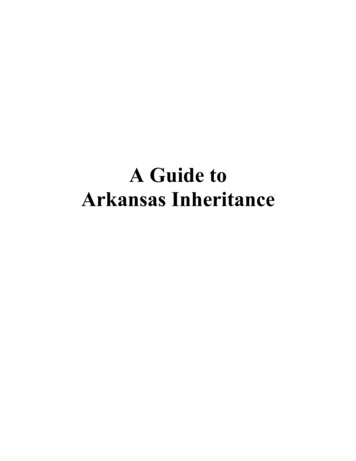
Transcription
A Guide toArkansas Inheritance
Table of ContentsChapter 1: Where It All Goes . 3Chapter 2: Homestead and Other Allowances . 4Chapter 3: Dower & Curtesy . 6Chapter 4: Intestate Succession . 13Chapter 5: Relevant Statutes . 152
Chapter 1: Where It All GoesWills, Trusts & Estates asks one question: Where does a decedent’s property go when he or shedies?A decedent’s property is transferred according to a priority of distribution. Here is the order:1. Non-Probate Transfers.Non-probate property includes that which passes under a right of survivorship (e.g.,property held in joint tenancy or tenancy by the entirety); life insurance property;interests held in a trust that are payable on death. Pages 38–39 of our casebook provide adescription of non-probate transfers. More to come on these transfers later in the course.2. Homestead and Statutory Allowances.Most states, including Arkansas, allow a surviving spouse and minor children to take aninterest in the homestead of the decedent. Arkansas also provides to the surviving spouseand minor children a small property allowance from the estate (up to a 4,000 value)along with personal property necessary for family use and occupancy of their dwelling.See Chapter 2: Homestead and Other Allowances.3. Dower (Curtesy).Arkansas provides the surviving spouse rights to property that the decedent held duringtheir marriage. These rights provide the surviving spouse a fractional interest of thatproperty. See Chapter 3: Dower & Curtesy.4. Creditors.Creditors of the decedent generally take from the estate only after non-probate transfers,homestead and statutory allowances, and dower. (Note: There is an exception for dowerdiscussed in Chapter 3.)5. Testate Succession (Will Beneficiaries).Property that passes under a will passes through testate succession.6. Intestate Succession.If property exists in the estate that does not pass under a will, it is distributed according tocertain family members and relatives as set forth in a statute. See Intestate SuccessionHandout. See Chapter 4: Intestate Succession.3
Chapter 2: Homestead and Other AllowancesArkansas provides the surviving spouse and children under 21 years of age rights in thehomestead of the decedent. Arkansas also provides a surviving spouse and minor children astatutorily set amount of property from the decedent’s estate along with personal propertynecessary for residential dwelling. This handout and the attached statutory supplement explainthese rights.Homestead.What are the homestead rights?In short, homestead rights provide the surviving spouse and the decedent’s children under 211rights to income (rents) and profits of the decedent’s homestead property. Creditors’ claims tothe decedent’s property are inferior to these rights.Who qualifies for the homestead rights?To qualify for homestead rights, the surviving spouse must have been married to the decedent forlonger than 1 year. If the decedent has no surviving children under age 21, the surviving spousehas the sole claim to all of the rents and profits of the homestead for his or her lifetime. If thedecedent is survived by children under age 21, then until the youngest child reaches 21, thesurviving spouse’s share of the rents and profits is limited to one-half, and the children under age21 share the other one-half of the rents and profits. If the surviving spouse dies before thechildren all turn 21, then the children under 21 are entitled to all of the rents and profits until age21. Note that the surviving children under 21 need not be children of the surviving spouse.What land qualifies as a homestead?A homestead must be owned and occupied as a residential dwelling by the decedent. Caselawprovides that the decedent spouse “must actually and in good faith occupy land as a residence,before the levy of an execution, to impress it with the homestead character and to make it exemptfrom the levy of the execution.” Smith v. Flash TV Sales and Serv., Inc., 706 S.W.2d 184, 187(Ark. App. 1986). The surviving spouse and children under 21 derive their homestead rightsfrom the character of the property that the decedent impressed upon it.How large may property be as a homestead?In the case of homestead property outside of any city, town, or village, the homestead may not bereduced to less than 80 acres (but may not be more than 160 acres). In the case of homesteadproperty within any city, town, or village, the homestead property may not be reduced to lessthan one-quarter acre (but may not be more than one acre).1Note that for homestead purposes, the benefited children are those under the age 21 rather the 18, which is the ageof majority in Arkansas for most purposes. The homestead rights reflect the concept of the homestead exemptionunder the Arkansas Constitution, which uses age 21. Ark. Const. art. 9, § 6.4
Other Allowances.Other rights of the surviving family members that must be accounted for before distribution ofthe heritable estate to the heirs include:(1) allowance of personal propertyTogether, the surviving spouse and minor children2 take the following:(a) personal property having a value of 4,000 ( 2,000 as against creditors);(b) whatever furniture and certain other personal property that are reasonably necessaryfor use and occupancy of the residence (provided the spouses were living together at thetime of the decedent’s death); and(c) a two-month sustenance allowance not exceeding 1,000.(2) two months of residential living and reasonable sustenance(a) The surviving spouse may reside in the chief residence of the decedent spouse for twomonths after death. (This period may be extended if dower is not assigned within thetwo months.)(b) The surviving spouse shall receive a “reasonable sustenance” for those two months.(3) proportional share of rent from the decedent’s real estateUntil dower (curtesy) rights apportioned to surviving spouse, the surviving spouse isentitled to rent from the decedent’s real estate proportional to the dower or curtesyinterest of that surviving spouse in that real estate.2Note that for allowance purposes, the benefited children are those who are minors (under 18)—not those under theage of 21.5
Chapter 3: Dower & CurtesyArkansas is one of the few remaining states that follow common law rights of dower and curtesy.Those rights provide a share of the decedent’s estate to the surviving spouse. They providepriority over rights of heirs, will beneficiaries, and creditors. Let me say that again. Rights ofdower and curtesy trump all: neither the rights of the decedent’s creditors,3 the rights ofbeneficiaries under the decedent’s will, nor the rights of heirs under intestate succession affectthe surviving spouse’s rights of dower or curtesy.It is best to learn Dower & Curtesy through a big-picture perspective before honing in on thenitty-gritty details. Accordingly, this chapter is organized as follows:I. Dower & Curtesy at a Glance .7II. A Closer Look.8III. A Much Closer Look .9A. Land—if there are surviving children .9B. Land—if there are not surviving children .11C. Personal Property .12IV. Adding in Homestead Rights .123To be completely truthful, creditors may “affect” the quantity of property a surviving spouse takes. More on thatto come. The general principle, however, is that creditors cannot bar a surviving spouse from exercising dower orcurtesy rights.6
I. Dower & Curtesy at a GlanceBelow is a brief overview of the dower and curtesy rules under Arkansas law:Decedent survived by spouse and one or more children—the spouse is endowed with: (1)a life estate in one-third of most real estate interests that the decedent owned at any timeduring the marriage; and (2) one-third of the personal property owned by the decedent atthe time of death. These interests are not subject to creditors.Decedent survived by spouse but no children—the spouse is endowed with: (1) one-halfof the decedent’s real property that the decedent owned at any time during the marriage;and (2) one-half of the personal property that the decedent owned at the time of death.Two important caveats apply: first, this one-half amount is reduced to one-third as againstcreditors of the estate; and second, if any of the real estate is an “ancestral estate,” thesurvivor’s interest in that land (either one-third or one-half) is a life estate rather than feesimple.The above scheme may be represented in the following chart:Dower or Curtesy Rights of Surviving SpouseSurviving Child(or Descendant)Real PropertyPersonal Property1/3 life estate of land ever seizedduring marriage.1/3 absolute ownership thatdecedent owned at death.No Surviving Child(or Descendant)1/2 fee simple of land everseized during marriage.Creditors may reduce to 1/3.1/2 absolute ownership thatdecedent owned at death.Creditors may reduce to 1/3.As general background, the following principles are noteworthy: Dower refers to the rights of a surviving wife. Only a surviving wife can beinvested (or “endowed”) with dower. Curtesy refers to the rights of a surviving husband. Only a surviving husband canbe invested (or “endowed”) with curtesy. As of 1981, the rights of dower and curtesy under Arkansas law are equivalentrights (only the names differ).7
II. A Closer LookThe basic rules of dower and curtesy vary depending upon several factors. The “basic rules” arerules that determine (1) whether a dower or curtesy right attaches to a specific property interest,and if so, (2) what the “quantity” and “quality” of the resulting dower or curtesy rights are in thatproperty interest. (Note that “quantity” and “quality” are words for my own convenience.)Quantity and Quality By “quantity,” I mean the fractional part of the property to which the survivingspouse is endowed. The quantity will be either one-half or one-third of theproperty affected. By “quality,” I mean the nature of the estate to which the surviving spouse isendowed. Under Arkansas law, a dower or curtesy interest in personal property isalways absolute ownership, while a dower or curtesy interest in land may beeither a life estate or fee simple ownership (depending on the circumstances).Circumstances Affecting the Quantity and Quality The quantity and quality of a dower or curtesy interest will vary depending on:(1) whether or not the decedent was survived by any children;(2) whether any particular property interest is an interest in land (and whatsort of land interest); and(3) whether any particular property interest is an interest in personal property.Creditors As a general matter, a surviving spouse takes the dower or curtesy interest free ofclaims by the decedent spouse’s creditors. (This creditor-free interest may bereduced from 1/2 to 1/3, however.) This creditor-free principle of dower and curtesy is important because assets thatpass to intestate heirs and beneficiaries under a decedent’s will are subject to thevalid and timely claims of the decedent’s creditors.8
III. A Much Closer LookWe should now consider separately the law concerning real estate and the law concerningpersonal property.4A. Land—if there are surviving childrenIf a decedent died with surviving children, then the surviving spouse is endowed with alife estate in one-third of the lands affected. In other words, the quantity is always onethird of the land, and the quality is always a life estate. See Ark. Code § 28-11-301.Note that the decedent must be survived by at least either one child or one descendant.5What lands are affected? The surviving spouse has a dower or curtesy interest in all thelands of which the decedent “was seized, of an estate of inheritance, at any time duringthe marriage.” This involves three distinct elements for analysis:(1) at some time during the marriage, the decedent must have owned an interest inthe land;(2) the interest must have been one of which the decedent was seized; and(3) the interest must have been an estate of inheritance.Let us consider these three elements more thoroughly.First, at any moment during the marriage, did the decedent ever own an interest in anyland? “During” is the key word, and you must take it literally. It does not matter whetherthe decedent acquired the interest in real property before or after the date of the marriage,and it does not matter whether the decedent still owned the property at the time of death(unless the spouse properly released the dower or curtesy interest or some other specialrule applies). In all of these situations, the decedent owned the interest at some timeduring the marriage.Only if the answer to the first question is yes—the decedent owned an interest in realestate at some time during the marriage—then go on to the second question.Second, was the decedent “seized” of the land interest during the marriage? Recall theconcept of seisin from your Property Law course. For our purposes, we will looselytranslate “seized” to mean that the decedent held an ownership interest in the property4The most important statutory provisions governing dower and curtesy are embodied in Ark. Code Ann. §§ 28-11301, 28-11-305 and 28-11-307.5For purposes of § 28-11-301, the term “child” includes the surviving issue of a child who predeceased thedecedent.9
that gave the decedent the right to possession. Fee simple ownership, of course, satisfiesthis requirement.Note that only holding a remainder interest would not count as being “seized.” Aremainder interest would never have entitled the decedent to present possession, so theremainder interest of a decedent would not be subject to dower or curtesy rights.6Only if the answer to the second question is yes—the decedent was seized of theinterest—then move to the third question.Third, was the decedent’s interest “an estate of inheritance”? This essentially means thatthe interest must be an interest that can be inherited by the decedent’s heirs. A life estate(measured by the decedent’s life) is not an estate of inheritance because the estateterminates upon death. Similarly, if the decedent and another person owned real estate injoint tenancy with right of survivorship, or if the decedent and spouse owned the realestate as tenants by the entirety, the decedent’s interest was not an estate of inheritancebecause the survivorship feature caused the surviving tenant to become the sole ownerwhen the decedent died, and there was nothing left in the decedent’s estate to pass byinheritance.Implications of § 28-11-301Some implications of these qualifications for dower may seem counterintuitive.Consider an unmarried person who acquires ownership of land, then marries, thenlater sells that land to a third person (without proper joinder of the spouse), andultimately dies leaving a surviving spouse. The surviving spouse has a dower orcurtesy interest in the land even though the decedent did not own any interest in itat death. At the time of marriage each spouse acquires a potential right(“inchoate” dower or curtesy) in all land of which the other spouse is seized of anestate of inheritance, and throughout the marriage each spouse acquires inchoatedower or curtesy in all land of which the other spouse subsequently (during themarriage) becomes seized of an estate of inheritance. In effect, a third partypurchasing from a married seller acquires title to the land subject to the inchoatedower or curtesy claim of the seller’s spouse. For this reason, someonepurchasing land in Arkansas from a married seller should require a proper waiveror release from the seller’s spouse. This requirement quickly becomes secondnature to anyone who deals with title to Arkansas real estate. A spouse’s inchoateclaim to dower or curtesy may, however, be extinguished if the conveyance hasbeen of record for seven years or more prior to the transferor spouse’s death. SeeArk. Code § 28-11-203.6Consider a conveyance of Blackacre to A for life, remainder to B: while A is alive, A is seized of an estate inBlackacre and is presently entitled to possession; B has a future interest, is not currently entitled to possession, andis therefore not seized.10
B. Land—if there are no surviving childrenIf there are no surviving children (or descendants), the surviving spouse is entitled to afee simple in one-half of the land of which the decedent was ever seized duringmarriage.7 See Ark. Code § 28-11-307. The three questions asked above apply here aswell:(1) At any moment during the marriage, did the decedent ever own an interest inany land?(2) Was the decedent “seized” of the land (during the marriage)?(3) Could the decedent’s interest be inherited by the decedent’s heirs?Important Note: There are two important subsidiary rules concerning land where thedecedent has no surviving children (§ 28-11-307):First, the one-half fraction shrinks to one-third as to any creditors of the estate. Inother words, if the value of the estate is inadequate to pay all of the decedent’screditors, only a one-third interest is subject to the dower or curtesy interest freeof the claims of the decedent’s creditors.Second, the quality of the dower or curtesy interest changes to a life estate ratherthan fee simple if the decedent was seized of an “ancestral estate.” The clearestexamples of ancestral estates are land that the decedent inherited from a parent orland that the parent gave to the decedent as a gift.87Although § 28-11-307 refers to “real estate of which the deceased person died seized,” the case law treats thatphrase substantially as the equivalent of § 28-11-301’s reference to lands “whereof . . . [the decedent] was seized, ofan estate of inheritance, at any time during the marriage.” In other words, you may assume that the real estateinterests to which dower or curtesy attaches under § 28-11-307, where the decedent leaves no surviving children, arethe same as the real estate interests to which dower or curtesy attaches under § 28-11-301, where the decedent issurvived by one or more children, even though the two statutes provide different rules concerning the quantity andquality of the resulting dower or curtesy interest.8The concept of an ancestral estate is simple enough to state, but the facts surrounding the decedent’s acquisition ofthe land may make the determination complex. See Earl v. Earl, 225 S.W. 289 (Ark. 1920).11
C. Personal propertyQuality: The surviving spouse always takes an absolute ownership in personal property ofthe decedent. The quality of the interest in personal property does not change, regardlessof the property source (as contrasted with a decedent’s ancestral estate in land).Quantity: The quantity that a surviving spouse takes is always based on the personalproperty that a decedent owned at the time of death.Two different scenarios exist for determining the fractional quantity interest: whether thedecedent did or did not leave children (or descendants):1. Personal property —if there are surviving childrenWhere there are surviving children (or descendants), the surviving spouse is entitled toone-third of the personal property that the decedent owned at death. See Ark. Code § 2811-305. As mentioned above: (1) the surviving spouse’s ownership that attaches to thedecedent’s personal property is absolute; and (2) dower or curtesy attaches to thedecedent’s personal property that the decedent owned at the time of death.2. Personal property—if there are no surviving childrenWhere there are no surviving children (nor descendants), the surviving spouse is entitledto one-half of the personal property that the decedent owned at death. See Ark. Code §28-11-307. Important note: The one-half interest in personal property is reduced to onethird as to creditors of the estate (as is the case in with land). As mentioned above: (1)the surviving spouse’s ownership that attaches to the decedent’s personal property isabsolute; and (2) dower or curtesy attaches to the decedent’s personal property that thedecedent owned at the time of death.IV. Adding in Homestead RightsHow Do Dower Rights Interact with Homestead Rights?The surviving spouse’s right of dower or curtesy and the homestead right are cumulativein nature. For example, a surviving spouse may claim dower or curtesy against all of thedecedent’s property to which dower and curtesy apply, plus homestead rights, plus theother allowances. The surviving spouse may seek to have dower or curtesy and thehomestead right set aside in the manner that will produce the greatest economic benefit.12
Chapter 4: Intestate SuccessionAfter distributing property according to non-probate transfers and homestead, statutoryallowances, and dower rights, what is left? The answer is: the heritable estate. From this estatecreditors are paid first; then will beneficiaries; and then finally—if property exists that does notpass under a will—the heirs of the decedent. This chapter focuses on the last category of takersin the heritable estate—intestate succession by heirs of the decedent.Property that it distributed through intestate succession passes to members of the decedents’living family according to a statutorily-set priority list. A family member’s relationship to thedecedent determines how much, if any, of the property the family member takes. (This makessense: the Decedent’s Great Uncle Vern should not take as much as the Decedent’s Children orWife.) This priority of distribution is contained in a statute that is called a Statute of Descent.I. DescentThe order of priority in which the heritable estate passes to family members of thedecedent is as follows:(1) Surviving children (and the descendants of any predeceased child) divide the entireheritable estate.(2) Surviving spouse. If there are no surviving children or descendants of children, thenthe surviving spouse (in addition to taking dower or curtesy) takes the entire heritableestate. There is, however, an exception to this rule: if the decedent was married to thesurviving spouse for less than three years, the surviving spouse’s share (inaddition to dower or curtesy) is limited to fifty percent of the heritable estate.(3) Surviving parents (share the entire estate equally if both survive).(4) Brothers and sisters (and descendants of predeceased brothers and sisters).(5) Grandparents, uncles and aunts (and descendants of predeceased uncles and aunts).13
(6) Great grandparents, great uncles and great aunts (and descendants of predeceasedgreat uncles and great aunts).(7) Surviving spouse of marriage less than three years, OR if the spouse of the decedenthas already died, persons who would have been the heirs of the deceased spouse (notthe decedent because the decedent has no heirs!) as of the decedent’s death. Let meexplain. If the entire heritable estate has not passed to the heirs listed in the first sixcategories above, then a surviving spouse from a marriage of less than three yearswill inherit the remaining heritable estate. If, however, the decedent’s spouse diedfirst, then the heritable estate passes to those persons who would have been thedeceased spouse’s heirs as of the decedent’s death (i.e., not the deceased spouse’sactual heirs determined as of the date of the deceased spouse’s death, but the heirswho would have been determined for the deceased spouse if he or she had died at thetime of the decedent’s death).(8) If no one is capable of inheriting under any of the above seven categories, then theestate escheats to the county in which the decedent resided at death.See Ark. Code §§ 28-9-214, 28-9-215.II. DistributionThe Arkansas rules determining the individual shares taken by the members of a class ofheirs are similar to those followed in many other U.S. jurisdictions. The Arkansas methodcomports with the most common approach, which the casebook alternatively names the“modern (American) per stirpes method,” alternatively referred to as the “per capita withrepresentation” method.9Truthfully, this method is easiest explained with a graphical representation than it is bywritten prose. Therefore, it will be covered in class rather than here in the handout. Seealso Ark. Code Ann. § 28-9-204.9Section § 28-9-205 labels this method “per stirpes” distribution as applied to heirs who take as descendants of aperson who predeceases the intestate decedent.14
Chapter 5: Relevant Statutes§ 16-66-210. Homestead Exemption Act(a) This section shall be known and may be cited as the “Homestead Exemption Act of 1981”.(b) The homestead of any resident of this state who is married or the head of a family shall not besubject to the lien of any judgment, or decree of any court, or to sale under execution or otherprocess thereon, except such as may be rendered for the purchase money or for specific liens,laborers' or mechanics' liens for improving the homestead, or for taxes, or against executors,administrators, guardians, receivers, attorneys for moneys collected by them, and other trusteesof an express trust for moneys due from them, in their fiduciary capacity.(c)(1) The homestead outside any city, town, or village, owned and occupied as a residence,shall consist of no more than one hundred sixty (160) acres of land, with theimprovements thereon, to be selected by the owner. The homestead shall not exceed invalue the sum of two thousand five hundred dollars ( 2,500), but, in no event shall thehomestead be reduced to less than eighty (80) acres, without regard to value.(2) The homestead in any city, town, or village, owned and occupied as a residence, shallconsist of not more than one (1) acre of land, with the improvements thereon, to beselected by the owner. The homestead shall not exceed the sum of two thousand fivehundred dollars ( 2,500) in value, but in no event shall the homestead be reduced to lessthan one-quarter ( 1/4 ) of an acre of land, without regard to value.(3) Any homestead outside any city, town, or village, owned and occupied as a residence,which is annexed to or made part of an incorporated city or town within the State ofArkansas, shall retain its exemption under subdivision (c)(1) of this section as long as theland on which it is located remains rural in nature and has a significant agricultural use.(d) The homestead provided for in this section shall inure to the benefit of the minor children,under the exemptions provided in this section, after the demise of the parents.15
§ 28-9-204. Per Capita TakingHeirs will take per capita in the following circumstances:(1) (A) If all members of the class who inherit real or personal property from an intestate arerelated to the intestate in equal degree, they will inherit the intestate's estate in equalshares and will be said to take per capita.(B) For illustration:(i) If the intestate leaves no heirs except children, the children will take per capitaand in equal shares;(ii) If the intestate leaves no heirs except grandchildren, all the grandchildren willtake per capita and in equal shares;(iii) If the inheriting class consists solely of great-grandchildren, or any moreremote descendants of the intestate who are all related to the intestate in the samedegree, they will take per capita.(C) The same rule applies to the inheritance by collateral heirs of the intestate as where,for illustration, the inheriting class consists entirely of brothers and sisters, or consistssolely of nieces and nephews who are descendants of deceased brothers and sisters, orconsists of any other collateral relatives of the intestate who are related to the intestate inequal degree.(D) Likewise, where the inheriting class consists of uncles, aunts, and grandparents orgreat uncles, great aunts, and great grandparents who, under § 28-9-214, may constitutean inheriting class even though they represent different generations, all members of sucha class who survive the intestate will take per capita and share equally.(2) If the members of the inheriting class are related to the intestate in unequal degree, thosein the nearer degree will take per capita or in their own right, and those in the moreremote degree will take per stirpes or through representation as provided in § 28-9-205.16
§28-9-214. Descent TableThe heritable estate of an intestate as defined in § 28-9-206 shall pass as follows upon theintestate's death:(1) First, to the children of the intestate and the descendants of each child of the intestate whomay have predeceased the intestate. The children and descendants will take per capita or perstirpes according to §§ 28-9-204 and 28-9-205.(2) Second, if the intestate is survived by no descendant, to the intestate's surviving spouse unlessthe intestate and the surviving spouse had been continuously married less than three (3) yearsnext preceding the death of the intestate, in which event the surviving spouse will take merelyfifty percent (50%) of the intestate's heritable estate;(3) Third, if the intestate is survived by no descendant or spouse, to the intestate's survivingparents,
6 Chapter 3: Dower & Curtesy Arkansas is one of the few remaining states that follow common law rights of dower and curtesy. Those rights provide

